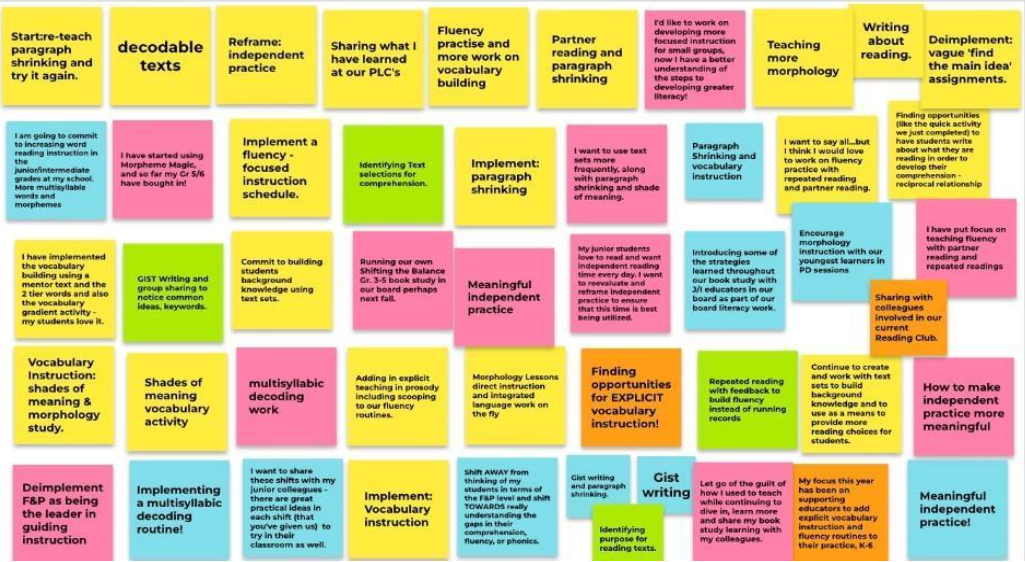Leigh is a Grade 4 French Immersion teacher at the Trillium Lakelands District School Board (TLDSB) in Muskoka. She has been a strong supporter of the shift towards evidence-based literacy practices at TLDSB. “I feel so fortunate because we have embraced screening (all of our educators in K-3 were trained in Acadience and Acadience Reading Français last year) and using evidence-based practices to teach reading, and are now shifting to include writing,” Leigh explains.
Leigh’s previous work as a Teaching and Learning Coach in TLDSB has had a profound impact on both educators and students. She recalls a primary educator who implemented whole-class partner reading based on screening data. The results were remarkable. “One of the students shared: ‘I used to be so scared to read with grown-ups, but now I don’t mind at all!’” Leigh notes how attitudes have shifted, with educators recognizing the value of universal screening data. “Throughout the year, I’ve loved watching attitudes shift from ‘I am going to be assessing all of the time!’ to understanding how essential and valuable universal screening data are in terms of letting us know who is at risk (individual students but also larger groups of students, such as classes or grade cohorts), who needs additional diagnostic assessments, and then planning instruction that targets needs in order to close gaps.”
Her approaches extend to targeted instruction. She shares her experience using DIBELS and later Acadience data to guide her core English Instruction in French Immersion settings. “For two years, I managed to do a 15-minute power session with a small group of students as they waited for late buses or their rides, almost every day. It was very targeted instruction in addition to solid instruction that they received during the day, and it was based on screening and diagnostics.” This targeted instruction proved highly effective in closing literacy gaps, helping students see themselves as readers and developing their decoding skills.
Leigh is also an active member of ONlit, answering educator questions with the Curriculum Assistance Team and developing content and professional learning events. In addition to answering inquiries through the online form regarding structured literacy and screening in French Immersion classroom, led the Shifting the Balance Junior/Intermediate Series book study last year. Reflecting on her experience leading the book study, Leigh shares, “It was an absolute treat to work through this book with Junior and Intermediate educators from around the province. A key takeaway was that educators of our older elementary students are hungry for learning around effective instruction and improving literacy.” The book study explored essential aspects of literacy, such as background knowledge, vocabulary, and decoding multisyllabic words. Leigh highlights the importance of comprehension strategies, noting, “The chapter on comprehension strategies was so powerful. It highlighted the importance of having texts at the centre of our strategy instruction.” During the last session, the group was asked to share their own ‘next steps’. Check out their amazing ideas:

Leigh was thrilled to be part of the Important Canadians Read Aloud Unit and co-wrote the comprehension and vocabulary lessons with Nellie Caruso. This year, Nellie and Leigh are collaborating on a book study on Dr. Heidi Anne Mesmer’s Teaching Complex Text. In this series, Leigh and Nellie dig into comprehension instruction, exploring practical tips and strategies for teaching students to unpack complex, challenging texts. Chapters explore sentence-level work such as examining anaphora and connectives, and digging into connected literary and informational texts.
Leigh Fettes’ commitment to literacy education, evidence-based practices, and targeted instruction continues to inspire and transform the learning experiences of both educators and students. As she transitions back to the classroom, her innovative approaches and dedication will undoubtedly enrich the Grade 4 French Immersion classroom and beyond.

